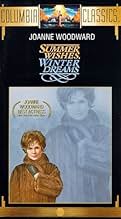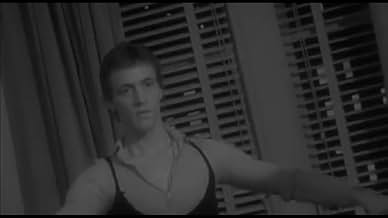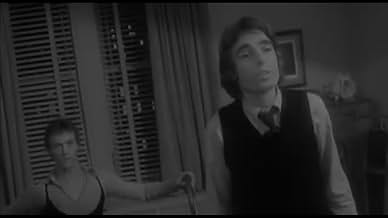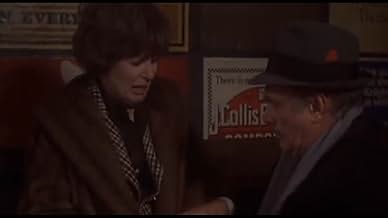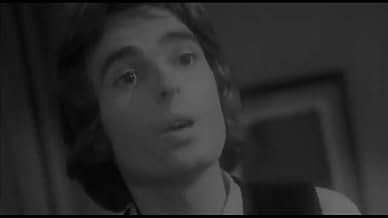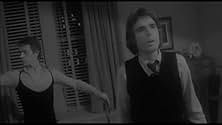Rita, a middle aged New York City homemaker, finds herself in an emotional crisis which forces her to re-examine her life, as well as her relationships with her mother, her eye doctor husban... Read allRita, a middle aged New York City homemaker, finds herself in an emotional crisis which forces her to re-examine her life, as well as her relationships with her mother, her eye doctor husband, her alienated daughter and estranged son.Rita, a middle aged New York City homemaker, finds herself in an emotional crisis which forces her to re-examine her life, as well as her relationships with her mother, her eye doctor husband, her alienated daughter and estranged son.
- Nominated for 2 Oscars
- 5 wins & 8 nominations total
Nancy Andrews
- Mrs. Hungerford
- (voice)
Charlotte Oberley
- Waitress
- (as Charlet Oberley)
- Director
- Writer
- All cast & crew
- Production, box office & more at IMDbPro
Featured reviews
This is a great movie showing Joanne Woodward and her husband in the film, Martin Balsam, dealing with their feelings and memories of the past and the events that have shaped them. I found this movie moving. Joanne Woodward's memories of she and her mother are memorable! I wish I had seen this movie when my mother was still living. Balsam's memories of his war experiences are insightful and moving. We are all shaped by our experiences!
In wintry New York City, attractive middle-aged Joanne Woodward (as Rita) awakens from nightmare. After battling insomnia, Ms. Woodward arranges to meet nicotine-stained mother Sylvia Sidney for lunch. The bickering mother and daughter suggest complaining may be an inherited trait. Woodward fears she's going blind, but husband Martin Balsam (as Harry Walden), conveniently an eye doctor, discovers his wife needs reading glasses. Keeping herself busy, Woodward babysits a crying grandson and sees a revival of Ingmar Bergman's "Wild Strawberries" with Ms. Sidney. During black-and-white movies, Woodward dreams in black-and-white. An unhappy event forces Woodward to reexamine her life. To help, Mr. Balsam takes his wife on a European trip...
"Summer Wishes, Winter Dreams" is a dreary story about an unlikable woman. Masterpieces may fit that description, but this isn't one of them...
The characters and story are rich, but undeveloped. The camera follows when it should lead and a few edits appear to favor scenery at the expense of characters. Most pointedly, Woodward's whimpering epiphany is inadequate. She never gets to let her hair down. Still, it's a good film. The acting is universally excellent. Woodward and Sidney won major acting awards. Balsam is just as good. Writer Stewart Stern does best with a secondary story involving Balsam's character, a World War II veteran. Self-identified "fat" daughter Dori Brenner (as Anna) and her aunt Tresa Hughes (as Betty) are brief, but memorable. Director Gilbert Cates artfully introduces Woodward's estranged son Ron Richards (as Bobby) in the opening nightmare, then, he is regulated to dreams.
****** Summer Wishes, Winter Dreams (10/21/1973) Gilbert Cates ~ Joanne Woodward, Martin Balsam, Sylvia Sidney, Dori Brenner
"Summer Wishes, Winter Dreams" is a dreary story about an unlikable woman. Masterpieces may fit that description, but this isn't one of them...
The characters and story are rich, but undeveloped. The camera follows when it should lead and a few edits appear to favor scenery at the expense of characters. Most pointedly, Woodward's whimpering epiphany is inadequate. She never gets to let her hair down. Still, it's a good film. The acting is universally excellent. Woodward and Sidney won major acting awards. Balsam is just as good. Writer Stewart Stern does best with a secondary story involving Balsam's character, a World War II veteran. Self-identified "fat" daughter Dori Brenner (as Anna) and her aunt Tresa Hughes (as Betty) are brief, but memorable. Director Gilbert Cates artfully introduces Woodward's estranged son Ron Richards (as Bobby) in the opening nightmare, then, he is regulated to dreams.
****** Summer Wishes, Winter Dreams (10/21/1973) Gilbert Cates ~ Joanne Woodward, Martin Balsam, Sylvia Sidney, Dori Brenner
Uptight, possibly frigid, panic-stricken middle-aged New York housewife has to learn to let go of the past, a refuge which doesn't necessarily bring her happiness but does provide her life with some kind of stability. Joanne Woodward gives a good performance here; not at all vain, and unafraid to let herself be pinchy, selfish, or even annoyingly helpless, Woodward overcomes this rather dreary "woman's picture" material with thoughtful touches and nuances. It's a heavy load however, and she doesn't have much help until the final reel when her needling, provoking matron takes a European trip with her husband (Martin Balsam, also doing fine work) and she comes to see her humanity as something she can work with as opposed to frittering it away. Screenwriter Stewart Stern's dialogue is heavy with a writer's pretensions, and often the chit-chat is pedantic, forced and unreal. Near the beginning, Woodward gets a phone call from her mother and asks, "Who is this?" A few scenes later, Woodward becomes exasperated with her husband and asks, "How many years have we been married?" These moldy exchanges are lazy outs for a writer wanting to introduce us to the characters; instead of letting us discover these people and their hang-ups for ourselves, everything is spelled out (and poorly so). We are to understand that Joanne's estranged son is gay after she has a dream in which a male dancer is caught in the boy's bedroom--in ballet tights! The 'colorless' color cinematography is a mix of putrid browns and greens, and director Gilbert Cates begins each new sequence with a big wind-up, as if the movie were starting all over again. The rhythm is off, and with lines like "You approach every new relationship like you would a toll-booth, Mrs. Santa Claus!", one doesn't know how to respond to the characters. It's possible that some of Woodward's jaunts to her past, both real and imaginary, will strike some viewers as very personal, but the film isn't especially moving, at least not until the final third. **1/2 from ****
By the early 1970's, films had become more personal and character studies were emerging on the screen. Such is the case with "Summer Wishes, Winter Dreams." At first glance, the film seems to be about Rita (Joanne Woodward) coping with the sudden and awful death of her mother (the wonderful Sylvia Sidney). The film then shifts to the apparently empty marriage between Rita and her husband Harry (Martin Balsam). They travel to Europe, where emotions and past resentments come to the foreground. Rita has much guilt about her son, who apparently wants nothing to do with her or Harry - we find out he is gay, but never the exact reasons why he can't stand either of them! (The son is seen only in flashbacks). Harry has a very emotional reaction while visiting Bastogne, where he fought in WWII. Rita has a breakdown in a London subway tunnel, apparently imaging she has seen her dead mother. Harry and Rita's daughter seems to have no purpose in the film except to be sanctimonious and shrill. This is not a perfect film, and at times the script jumps around. There are a few things that don't quite jive. There seems to be a lot of Freudian type psycho babble in the film (which was popular at the time). But it is the fine performance of Joanne Woodward that shines here. Ms. Woodward is one of the best actresses ever to grace the American cinema. Martin Balsam is in fine form here too. A quiet little film worth watching.
Not uplifting but good drama here, Joanne Woodward never disappoints. She is a middle-aged housewife in NYC, married to World War 2 veteran Martin Balsam. When her mother passes away suddenly she begins to re-examine her life.
There are no easy answers here, or "deux ex ma-china" moments wherein everything is solved and life goes on with a saccharine smile.
As a couple, Balsam and Woodward are believable here, in a stab at saving his marriage Balsam suggests a trip to Europe. There are some interesting flashbacks here as he recalls the 1940's when he was a 20 year old soldier killing other 20 year old at the Battle of Ardennes. The scenery is evocative and atmospheric.
Both are estranged from their lives, and children, but somehow manage to hold on. Woodward is always empathic, her scene as she has a quiet breakdown in the subway while remembering her deceased mother is believable. (I have been through something similar myself, mother having died in an accident). It is well-filmed and effective. Recommended. 9/10.
There are no easy answers here, or "deux ex ma-china" moments wherein everything is solved and life goes on with a saccharine smile.
As a couple, Balsam and Woodward are believable here, in a stab at saving his marriage Balsam suggests a trip to Europe. There are some interesting flashbacks here as he recalls the 1940's when he was a 20 year old soldier killing other 20 year old at the Battle of Ardennes. The scenery is evocative and atmospheric.
Both are estranged from their lives, and children, but somehow manage to hold on. Woodward is always empathic, her scene as she has a quiet breakdown in the subway while remembering her deceased mother is believable. (I have been through something similar myself, mother having died in an accident). It is well-filmed and effective. Recommended. 9/10.
Did you know
- TriviaFeatures Sylvia Sidney's only Oscar-nominated performance.
- GoofsWhen the gurney is wheeled out of the ER, the sheet over the body is relatively flat. When Rita is next to the gurney, the sheet is elevated due to the body's arms being across the body.
- Quotes
Mrs. Pritchard - Rita's Mother: I thought I was having a heart attack.
- ConnectionsFeatured in Oscars, Actors and The Exorcist (1974)
- SoundtracksWhere is your Heart
(Moulin Rouge)
Music by Georges Auric
French lyrics by Jacques Larue
English lyrics by William Engvick
- How long is Summer Wishes, Winter Dreams?Powered by Alexa
Details
Contribute to this page
Suggest an edit or add missing content


